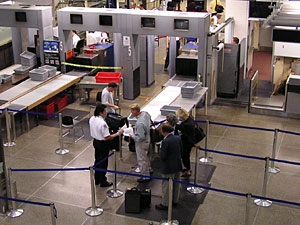|
Audio
Photos
More from MPR
Your Voice
|
High-tech screening offered for frequent travelers
June 16, 2004
The Transportation Security Administration has announced plans to begin testing its "Registered Traveler" program at several airports around the country. The TSA will launch the pilot program later this month at the Minneapolis-St. Paul International Airport. Travelers willing to volunteer will provide federal officials with personal information, including fingerprint and electronic scans of their iris. Once approved, those travelers will be able to use special security checkpoints. Proponents say the program will save people time and improve security. But some people say they'd rather wait in the regular lines than submit to the scrutiny the new program will require.
Minneapolis, Minn. — Almost immediately after the 9-11 attacks there was talk about using high-tech methods to ensure airline passengers actually were who they claimed to be.
That vision is about to become reality as thousands of frequent flyers who use five busy U.S. airports and who are willing to volunteer to be part of a test program, will have their identities confirmed through biometrics.
 | |||
These "registered travelers" will use "smart cards" at security checkpoints available only to them. Transportation Security Administration workers will check the information on those cards against the passengers' fingerprints. In some cases they will scan passengers' eyes.
TSA spokeswoman Amy Von Walter says officials hope 2,000 Minneapolis-St. Paul airport users will take part in the program, which she says will be offered only to certain travelers.
"You actually need to fly at least once a week. Northwest is our partner here in Minneapolis. They will be contacting eligible travelers. They will ask them to come here to the airport starting late next week to enroll in the program. We'll need name address some other personal information. They'll also need to bring two forms of government-issued photo ID and they'll need to provide fingerprint and iris scan information," she said.
Von Walter says the TSA will conduct background checks on those frequent flyers who wish to take part in the program. She says those who qualify could be using their smart cards at special security check points early next month, after the July 4 holiday.
Northwest Airlines officials declined to discuss the pilot project, but said in a written statement it's been a leading proponent of the "Registered Traveler" program and that it expects the program will make air travel more efficient.
The deputy executive director of operations at MSP, Tim Anderson, says in addition to speeding up security screening for some, the "Registered Traveler Program," will allow the TSA to spend more time scrutinizing passengers who are not frequent flyers.
 | |||
"I think it improves security because you've always had this as I mentioned before, process that treats everybody exactly the same. Now if we can separate those, the TSA can separate out folks who they know more about, they can actually concentrate the rest of the security efforts on folks they don't know about and that becomes a more efficient process."
Those who qualify as "Registered Travelers" will still be required to undergo baggage screening. They will not be subject to the random searches like other travelers.
A traveler, who identified himself only as "John from St. Paul," says he thinks the program will likely improve security, but not with his help.
"I'm not sure it'd be something I'd participate in. I generally travel pretty light and security for me -- even when it's high -- isn't that terribly inconveniencing and the benefit just wouldn't be there for me," he said.
John says he'd rather wait in the longer lines with everyone else than have the TSA put his life under a microscope, fingerprint him, and scan his eyes.
"I don't necessary like people running around doing investigations on me. It's a privacy issue," he said.
TSA officials say the data they collect will not be shared with other agencies and that a limited number of TSA staff will have access to the personal information.
Larry Williams, a frequent flyer from Atlanta, says provided there are strong privacy safeguards, the program sounds like a good idea; anything, Williams says, to streamline security.
"It would be courtesy and it would also help with the general flow of traffic in the airports. Those of us who do fly regularly spend a lot of time waiting in these lines and those who don't fly regularly only have that pleasure every so often," he said.
TSA officials says after the registration program is running in Minneapolis, they'll expand it to Houston. It will also be tested at Boston's Logan Airport, at Reagan National Airport in Washington and at Los Angeles International Airport.
The entire pilot program will take place over six months....three months at the Minneapolis- St. Paul International Airport.
The TSA won't say when "Registered Travelers" might become a standard option at all airports.
|
News Headlines
|
Related Subjects
|

